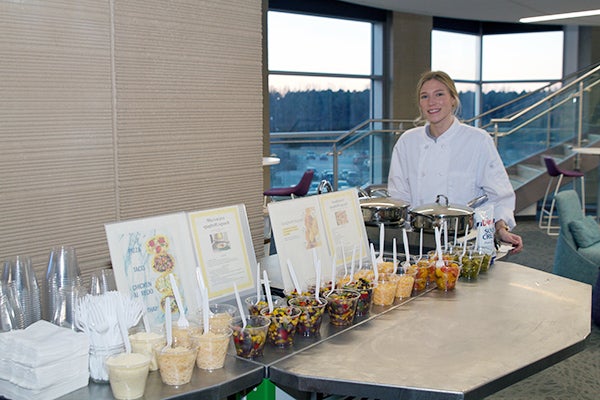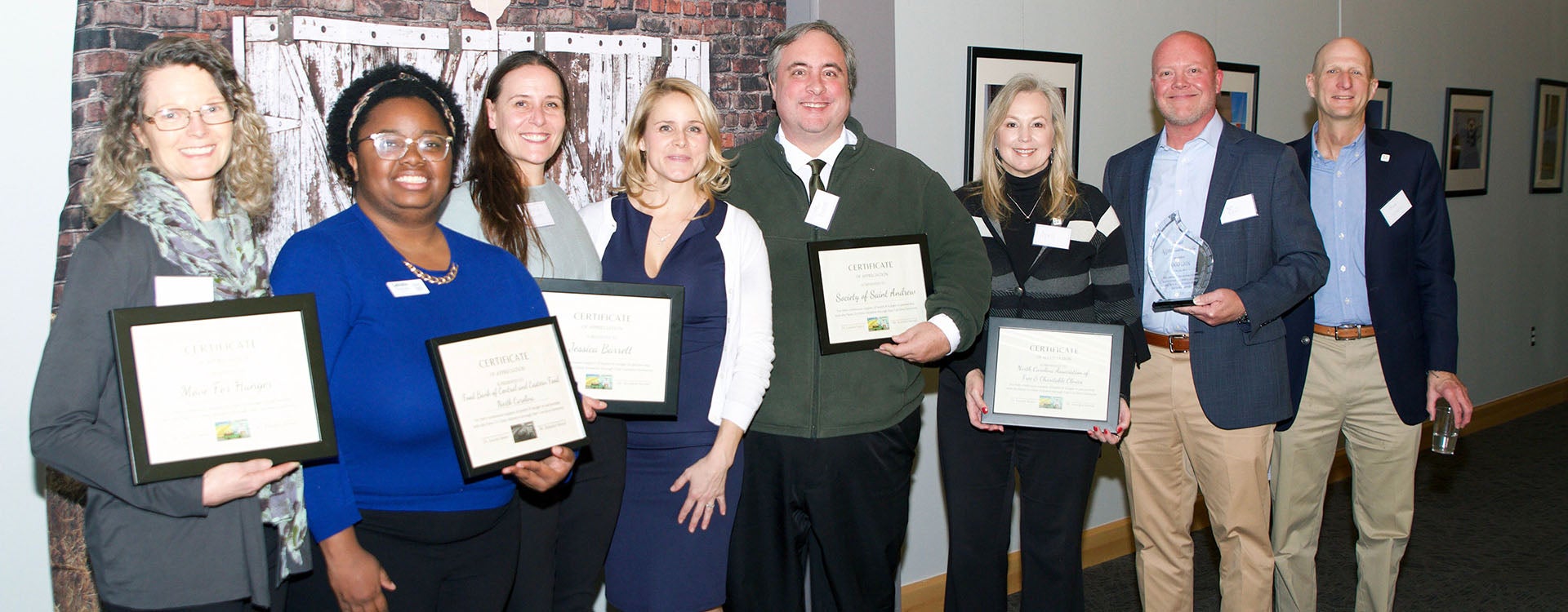ECU farm to clinic program boosts nutrition initiative
East Carolina University students are all in for experiential learning opportunities, especially when it comes to the farm to clinic program in the College of Allied Health Sciences’ Department of Nutrition Science.
“We love fruits and vegetables. You might have met a few of them tonight,” Lauren Sastre, assistant professor and registered dietitian nutritionist in ECU’s College of Allied Health Sciences, said during Friday’s Farm to Clinic (F2C) impact celebration, referencing students dressed as colorful produce. “We love what we do, and I hope it has shown through tonight.”
The celebration was the first public opportunity to showcase the program and the partners supporting the effort. Sastre founded the F2C initiative in 2019. Sastre and students connect underserved and under-resourced patients with healthful food and nutrition, lifestyle and culinary medicine programming to address chronic disease-related disparities, focusing on Type 2 diabetes.

Department of Nutrition Science student Cari Jones prepares to serve recipes cooked at edible education kitchen kiosks as part of the farm to clinic initiative. (Photos by George Crocker)
As part of showcasing the program, guests were treated to enticing vegetarian recipes cooked and served by students at edible education kitchen kiosks and informed about the students’ health coaching experiences and hands-on learning they receive in the F2C program.
The program’s success thus far results from work by ECU students and support from campus and community partners. New support from the Food Lion Feeds initiative and Move For Hunger will propel growth and continued outreach in eastern North Carolina. Food Lion is providing a mobile teaching kitchen, which is expected to be on the road with ECU in the spring.
“Food Lion Feeds nourishes our communities by identifying and developing connections with local partners like East Carolina University and participating in meaningful community efforts,” said David Garris, Food Lion’s director of operations for the Greenville region. “We believe no one should have to choose between dinner and rent or gasoline and buying groceries. That’s why we are so passionate about helping to end hunger in our local communities.”
Garris said that in addition to providing an invaluable service to the region, Food Lion recognizes ECU’s innovation in offering college students a learning opportunity to promote nutritional coaching and execute a farm-to-clinic program.
Move For Hunger has supported the initiative by donating a large cold storage unit to ensure adequate storage for fruits and vegetables obtained in collaboration with the Society of St. Andrew.
“This helps increase the pipeline of good food to the food insecure,” said Jackie Godlewski, program manager, fresh food with Move For Hunger. “It is great to have partners who are so passionate about the work.”
Cari Jones, a senior majoring in nutrition science, said the F2C program has provided her with amazing opportunities to learn and then offer that education to underserved people. Jones is excited to be pursuing plans to attend graduate school and aims to become a registered dietician nutritionist.
She demonstrated spaghetti squash recipes at one of the program’s edible education kitchen kiosks. As part of F2C, she travels to Bayboro and Elizabeth City clinics each week and teaches patients how to prepare healthy recipes. Jones has participated with other students in gleaning fields — the process of collecting leftover crops from fields that have been harvest or aren’t economically viable to harvest — with the Society of St. Andrew and using those foods in the clinics.
According to Sastre, student involvement and impact are key to every program aspect. Since 2019, nearly five dozen ECU students complete related internships, practicums and field experiences each year.
In the clinic communities, daily physical activity has increased through the program, patients have shown a decrease in A1C blood sugar levels, food literacy has increased, and more than 50,000 pounds of fresh produce has been recovered from North Carolina fields each year.
Additional external partners recognized during the evening for supporting F2C included:
- The Duke Endowment, which funded Fresh Start — a program within the F2C initiative — with a $365,000, 3-year health care grant.
- The Society of St. Andrew, that brings ECU students and others together to harvest and share healthy food, reduce food waste and build caring communities by offering nourishment to hungry neighbors.
- The Food Bank of Central and Eastern North Carolina, which provides perishable food distributed by F2C.
- The North Carolina Association of Free and Charitable Clinics a nonprofit organization of 71 member clinics and 87 clinic sites throughout N.C.
ECU is in the public phase of the Pursue Gold campaign to raise half a billion dollars. This ambitious effort will create new paths to success for Pirates on campus, across the country and around the world. Donor gifts during the campaign will keep us constantly leading and ready to advance what’s possible. Learn more at pursuegold.ecu.edu.

Corporate and community partners were honored for their support of the farm to clinic initiative.